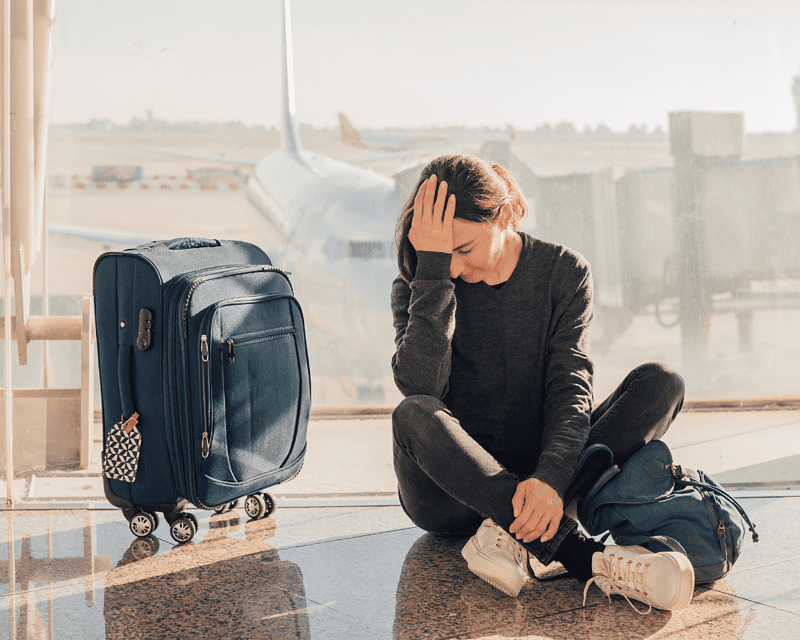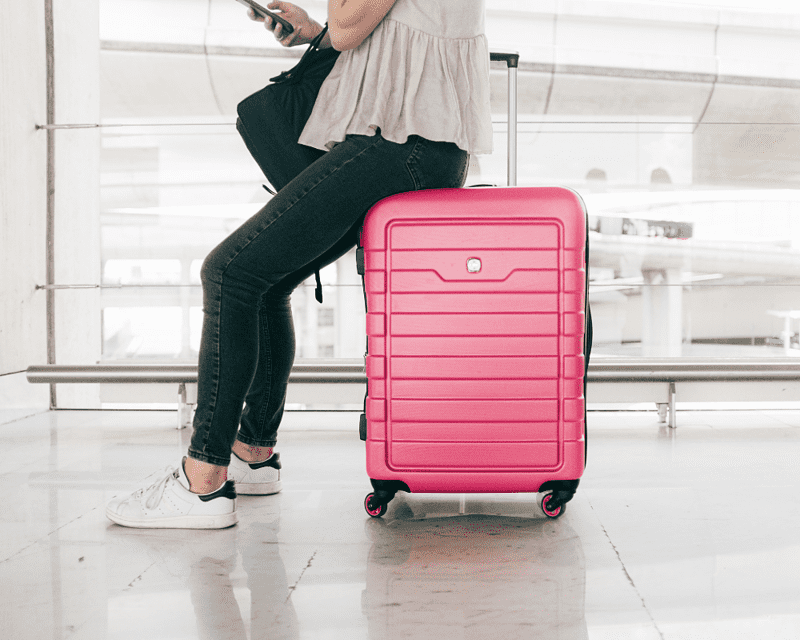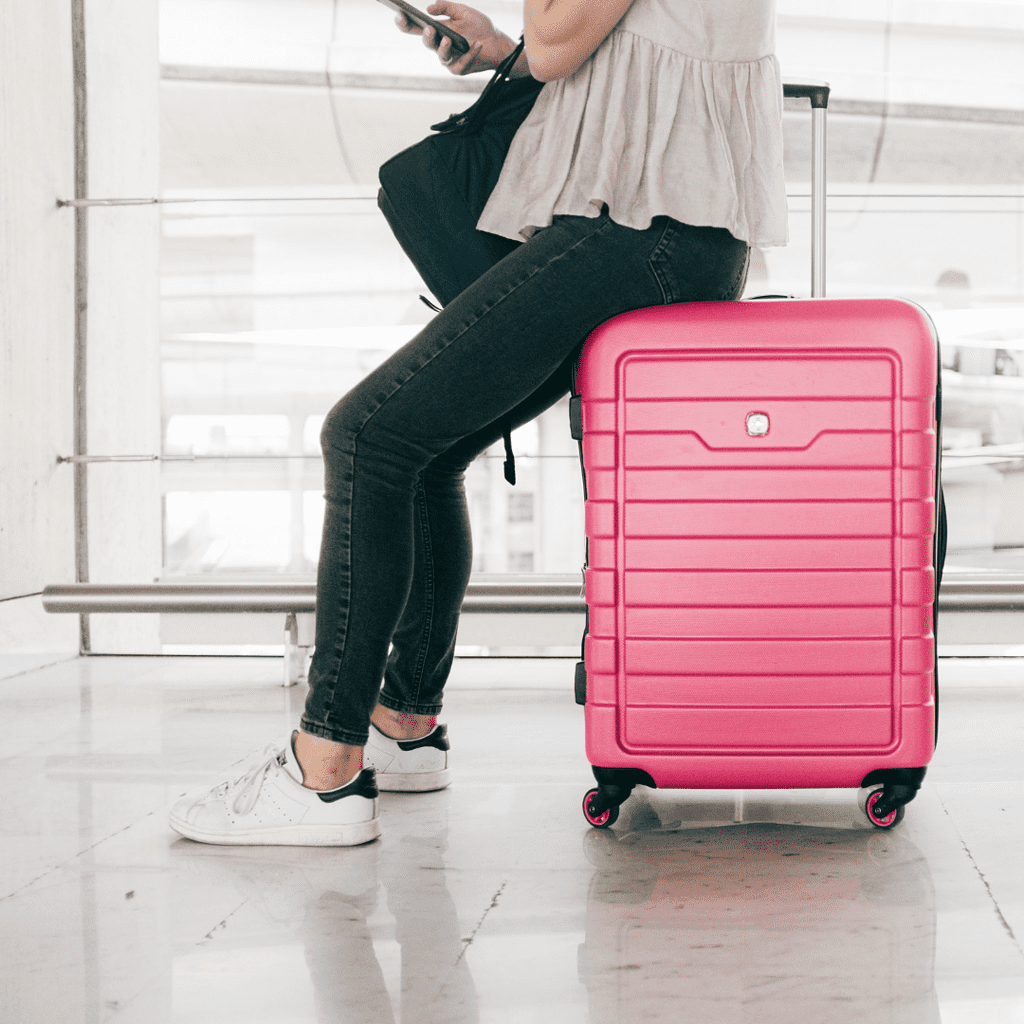In today’s world of travel, flights will inevitably be cancelled at some point. It can be a hassle for passengers left stranded and confused about what to do next. Unplanned accommodation and transportation costs can quickly add up, not to mention the stress of figuring out how to get where you need to go. In this article, we’ll cover the best steps you should take if your flights cancelled and how to navigate this tricky situation with ease.
What are flight cancellations?

Flight cancellations can be a significant frustration for travellers, disrupting their carefully planned itineraries and causing inconvenience. But what exactly are flight cancellations, and why do they happen? In simple terms, a flight cancellation occurs when an airline cancels a scheduled flight for various reasons.
There are many reasons why flights may be cancelled- bad weather conditions being one of the most common. For example, if there is heavy snowfall or thunderstorms in the area where the plane is departing, airlines may cancel flights to ensure passenger safety. Other factors that can cause flight disruptions include a technical problem on the aircraft or airport workers’ strikes.
While airlines do their best to avoid cancelling flights whenever possible, sometimes it cannot be helped. When this happens, passengers affected by the cancellation will typically receive a notification from their airline as soon as possible.
1: Check Your Rights
If you’ve ever experienced a cancelled flight, you know how frustrating it can be. Flights can be disrupted for various reasons, such as weather conditions or airline strikes. Whatever the reason, cancellations can throw your travel plans out of whack and ruin your trip before it even starts. However, before you start panicking and booking a different flight out of pocket, there are some legal rights that you should be aware of, which AirHelp can advise you on.
Firstly, if your flight is cancelled due to reasons within the airline’s control (such as crew shortages), they are legally required to offer compensation or an alternative flight. The amount of compensation varies depending on the distance travelled and the length of flight delays caused by the cancellation. Additionally, airlines must cover any costs incurred during the delay, such as meals and accommodation.
2: Seek Compensation
You may be entitled to compensation if your flight has been cancelled or delayed via your travel insurance policies. The amount of compensation you receive will depend on the length of the delay and the distance of your flight. In general, you may be eligible for compensation if your flight is delayed or cancelled for reasons within the airline’s control, such as mechanical issues or crew shortages.
To seek compensation, start by contacting the airline directly. They should provide information on how to submit a claim and what documentation is required. Be sure to keep all receipts and documentation related to your travel plans, including hotel bookings and transportation expenses incurred due to the delay or cancellation.
In addition to seeking compensation for any expenses incurred due to a disrupted travel plan, you may also be able to claim damages for any missed events or activities that were planned as part of your trip.
For future travels, it’s worth considering options that might offer more flexibility and savings. Some travelers have found great deals on cheap business class flights, which can provide both comfort and efficiency, especially for long-haul journeys. By being proactive in your travel research and planning, you can ensure a smoother experience and be better prepared for any unforeseen disruptions.
3: Contact Airline

Check your flight status on the airline’s website or app, being sure to double-check your flight number. If it has been cancelled or delayed for more than three hours, you may be eligible for compensation under EU Regulation 261/2004. Next, call the airline’s customer service number using the contact details in the app or on their website; you will need to provide them with your flight information and explain your situation to them. They will provide information about what kind of compensation is available and how to make a claim.
4: Look for Alternatives
If you ever find yourself in a situation where your flight has been cancelled, it’s essential to remain calm and think strategically. One of the first things you should do is check for any alternative flights. Most airlines will have a later flight to your destination, and although they may not be at the exact times or on the same day as your original flight, they will do their best to get you on the next available flight.
If you can’t find an alternative flight that works for you with available seats, look into onward transportation options such as trains or buses. Depending on where you are and where you need to go, this could be faster and more cost effective than waiting for another flight. It’s also worth checking with your airline to see if they offer any reimbursement or assistance with alternative transportation arrangements.
Another option is to consider re-routing through a different airport.
5: Ask for Refunds
If your flight has been cancelled, you may wonder if you are entitled to a refund. The answer? It depends on the airline’s policies and the reason for the cancellation. Generally, if an airline cancels your flight, they must offer you a full refund or rebook you on another flight at no additional cost.
However, there are some exceptions to this rule. For example, if the cancellation is due to circumstances beyond the airline’s control (such as severe weather or natural disasters), they may not be required to provide a refund. In these cases, airlines will often offer passengers vouchers or credits towards future flights instead.
If your flight has been cancelled and you believe you are entitled to a refund, contacting the airline as soon as possible is essential.
6: Make the Most of Time

When your flight gets cancelled, it can throw off your entire travel plans. It can be frustrating and stressful to rearrange everything at the last minute. However, there are ways to make the most of your time when your flight has been cancelled.
Firstly, stay calm and be patient. Remember that the airline staff are doing their best to help you get on with your journey. Secondly, use this unexpected free time to explore the airport or city you’re in. You might discover something new and exciting that you wouldn’t have had the chance to see otherwise.
Thirdly, take advantage of any amenities available in the airport, such as lounges or spas. Fourthly, stay connected and informed by social media or airline apps for updates on your flight status or other travel options.
Conclusion
In conclusion, if your flight has been cancelled, it can be frustrating and make navigating the airline’s policy difficult. You do have options, though, including requesting a refund or rebooking options for a later date. Another option is to look into alternate travel options, such as renting a car or taking a bus or train. Contacting customer service and using social media are also great ways to get answers quickly.


